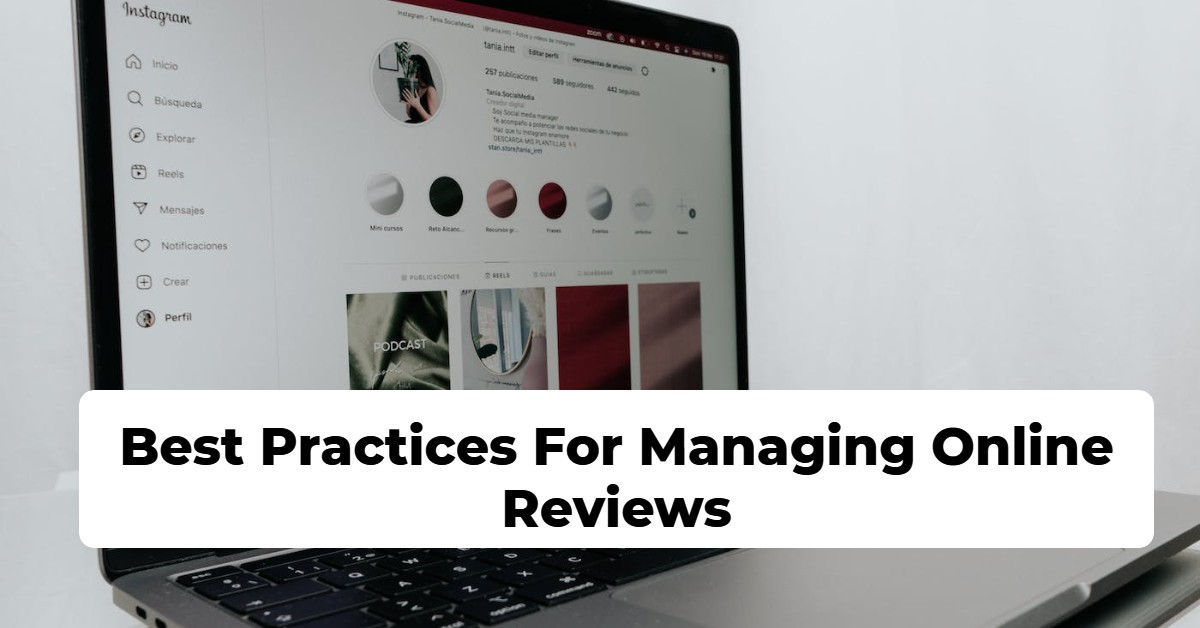Best Practices For Managing Online Reviews (Top 15)

Best Practices For Managing Online Reviews: Online evaluations have become so reliable that many consumers now trust them more than personal recommendations from friends and family. Meanwhile, over eight out of ten consumers will look at reviews on a website before making a major purchase. Obviously, companies can no longer afford to ignore customer feedback posted on their websites. You risk losing credibility if you don’t take charge of your online reviews.

Best Practices For Managing Online Reviews – FAQs & Answers
Can I respond to reviews anonymously?
It’s generally not recommended to respond to reviews anonymously, as it lacks transparency and may not be perceived as genuine by customers. It’s best to respond with your real name or the name of the business to show accountability and professionalism.
How can I use online reviews to improve my business?
You can use online reviews as valuable feedback to identify areas for improvement in your business. Look for patterns in feedback and take necessary actions to address any issues raised. It’s an opportunity to learn and grow your business.
How important is it to train my staff on managing online reviews?
Training your staff on managing online reviews is crucial, as they may be the ones interacting with customers and responding to reviews. Providing guidelines on tone, language, and resolution strategies can help ensure consistent and professional responses.
Why Should You Manage Online Reviews?
The most typical kind of client feedback in the current digital era is online reviews. Online reviews differ from more conventional kinds of consumer feedback, including as surveys and customer satisfaction questionnaires, in that they are published online and are accessible to everyone, at any time.
The posting of online reviews is also possible through a variety of channels, from your e-commerce website or online store to marketplaces and other review sites like Google, Amazon, Yelp, and others. Numerous such sites enable consumers to express their thoughts, experiences, and stories in the form of online reviews, which other people may read to make educated judgements about your business and products.
The point is that in the long term, internet reviews might have a significant influence on both the purchasing choice of potential customers and your company’s image. And this raises the issue of what practical strategies or methods you ought to employ in dealing with them.
In order to address that, I have included a list of 15 recommended practises that you can apply to not only respond to negative internet reviews in your favour but also to maximise their value in the long run. Keep Scrolling.
Read: What Companies are in the Customer Services Field?
15 Best Practices For Managing Online Reviews
1. Find the best candidate for the position
It’s just as crucial to choose the correct individual to handle internet reviews as it is to respond to them. The person you select must be customer-focused, sympathetic, and above all, a problem-solver who can independently examine, address, and resolve concerns that can arise in online reviews. When necessary, the individual in charge of this position must also have the power to transfer or escalate the problem to higher levels.
2. Monitor Your Reviews
Monitoring your internet reviews frequently is the first step in controlling them. Create alerts so that you are informed every time a new review is submitted on a review platform. This will assist you in keeping track of any unfavourable comments that require rapid attention. To keep track of your reviews, you may use a variety of tools like Google Alerts, Mention, or Hootsuite.
3. Respond to All Reviews
It is imperative to answer all evaluations, both favourable and unfavourable. By responding to favourable evaluations, you may let your clients know you value their opinions and invite them to keep doing business with you. Responding to unfavourable reviews shows that you are dedicated to resolving client issues and enhancing the client experience in general.
4. Respond promptly
Always respond as quickly as possible, especially to critical feedback. It is important to acknowledge the comments and demonstrate that you appreciate the viewpoint of the consumer. Stay away from getting argumentative or defensive, and instead focus on finding a solution to the problem that was brought up.
5. Make your answers more specific
Review replies should have as much individualization as feasible. To indicate that you have read and comprehended the reviewer’s remarks, be sure to use their name and relevant examples from their review. Customers will feel more connected to you and more likely to stick with you if you do this.
6. Encourage positive feedback by responding
In the corporate world, good feedback is highly valued. They may aid with brand exposure by improving your search engine results in addition to helping you establish and obtain market trust. In addition, by responding to favourable reviews, you show your clients that you value their feedback and care about them. Additionally, by doing this, you might inspire others to endorse your company in favourable comments.
In addition to thanking and encouraging the consumers, you may take use of this occasion to invite them to sample or try a product in return for their frank comments. Customers enjoy receiving free samples because they feel valued and exclusive.
7. Be receptive to negative reviews
Responding to negative feedback is even more vital than responding to positive input. Negative evaluations might be damaging and have long-lasting impacts if they persuade people to avoid your company. In fact, the vast majority of internet buyers, or 94%, avoid doing business with businesses that receive bad ratings.
So what should you do if you receive a bad or critical review?
Simple! Start by expressing sympathy and recognising the current problem. Offer them the solution and assume responsibility for the prompt resolution. Keep in mind that you have the ability to transform a bad review into a favourable one.
8. Take the conversation offline
It can be better to move the chat offline if the consumer has a very difficult problem or complaint. Give the consumer a way to get in touch with you directly to discuss the issue, such as an email address or phone number. This demonstrates your dedication to fixing their issue and assists in preventing more unfavourable reviews on the public review platform.
9. Use online influencers
There are several online influencers that have been instrumental in influencing various markets and fashion trends. The apparent cause is their enormous fan base, who actively listens to them. Making friends with such well-known influencers in your industry or field of expertise to help promote your company will always be a wise move, even if you have to give them your goods or services for free.
10. Avoid reading fake reviews
False internet reviews may seriously harm your brand’s reputation in the marketplace, thus they should be avoided at all costs. Some of the key cues that might help you identify and distinguish false reviews from genuine ones include repetitive remarks, incomplete or contradictory information, and third-party mentions.
You may also inform the administrators of the platform about these spammers and harmful reviews in order to get them removed as quickly as feasible. As long as they are sincere and you answer to them promptly, keep in mind that the more evaluations you receive, the more well-known your business becomes.
11. Encourage Positive Reviews
Making it simple for your consumers to post favourable evaluations will encourage them to do so. On your website, in social media posts, and in email newsletters, provide links to your review profiles. Provide rewards like discounts or free items in exchange for reviews. Follow the instructions provided by the review site and abstain from any actions that may be construed as unethical or against the rules of the platform.
12. Analyse Your Reviews
Analysing your reviews might give you useful information about the advantages and disadvantages of your company. Look for recurring themes or problems brought up in unfavourable evaluations. This might assist you in locating problem areas and implementing the required adjustments. Monitoring your reviews can also give you insightful feedback on any new goods or services you’re thinking about introducing.
13. Keep Your Information Updated
Make sure all review sites have the most recent version of your company’s information. This includes your address, contact information, online presence, and open hours. To prevent clients from being confused, this information has to be consistent across all platforms.
14. Avoid disclosing confidential information
In your comments, exercise extreme caution so as not to reveal any sensitive information pertaining to either the client or your company. Protect the critical information of your company while also respecting the privacy of your customers.
15. Use Reviews to Improve Your Business
Finally, use your reviews to help you grow your business. Consider the suggestions made seriously and apply them to improve the products or services your company offers. Encourage your staff to read customer evaluations and to consider their input carefully. Increased customer satisfaction and loyalty may result into more income and growth if you’re committed to making changes to your company based on consumer feedback.
Conclusion
In conclusion, managing online reviews is a crucial aspect of maintaining a positive online reputation for businesses. By monitoring review sites, responding promptly and professionally, encouraging positive reviews, and using feedback constructively, businesses can effectively manage their online reviews. It’s important to be transparent, proactive, and customer-centric in your approach and to train your staff to handle customer feedback with professionalism. By following best practices for managing online reviews, businesses can build a strong online reputation and attract more customers.
Related:
10 Best Strategies For Promoting Local Brick-and-Mortar Business Online
